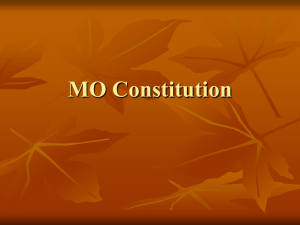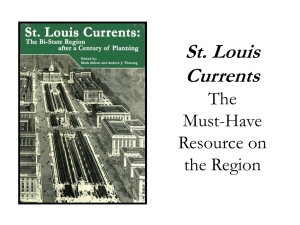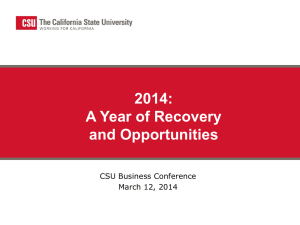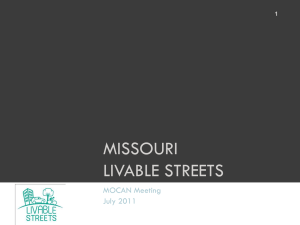Missouri`s Constitution & State Government
advertisement
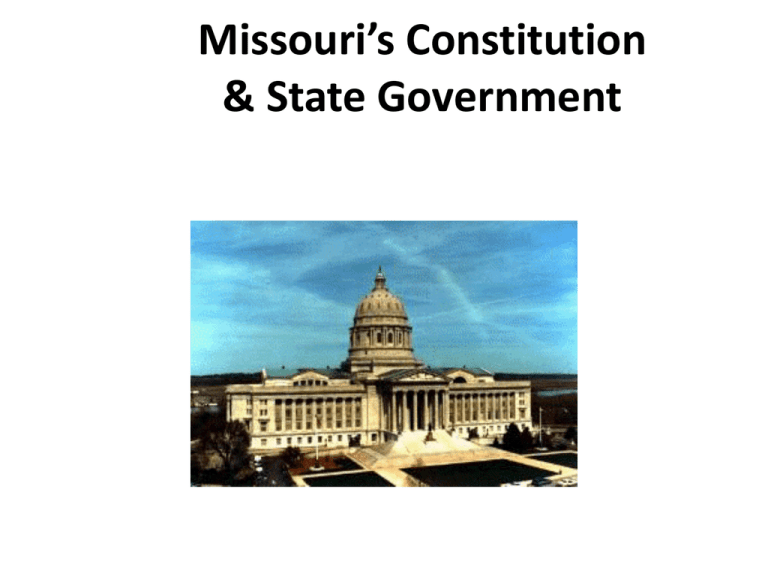
Missouri’s Constitution & State Government All States Have Police Power Under 10th Amendment state governments and the people hold powers neither given to the Federal government nor prohibited to the states Residual powers broader than those of the Federal government States assumed to have all authority not prohibited in Federal or state constitutions Police Power: The principal state power--gives each state authority to provide for the health, morals, safety and welfare of its people. • Using its Police Power a state can regulate • Health – Marijuana laws • Safety – Speed Limits • Morals – Liquor laws • Welfare – Outlaw child labor How Is the MO Constitution Organized? ARTICLE I BILL OF RIGHTS CONSTITUTION OF THE STATE OF MISSOURI Bill of Rights In order to assert our rights, acknowledge our duties, and proclaim the principles on which our government is founded, we declare: Sec. 1. That all political power is vested in and derived from the people; that all government of right originates from the people, is founded upon their will only, and is instituted solely for the good of the whole. Popular Sovereignty How Free Are You in Missouri? This study scores economic freedom in three primary ways: (1) it includes measures of social and personal freedoms such as peaceable citizens’ rights to educate their own children, own and carry firearms, and be free from unreasonable search and seizure; (2) measures of economic freedom; and (3) it measures state’s fiscal policies. How Free Are You in Missouri? • 11th best on economic freedom – Labor laws – Land use laws • 6th best on personal freedom. – Drugs & Gambling • 5th Freest Overall! – Government spending is nearly a full standard deviation below average. – State Freedom Video from Mercatus.org How is Our State’s Government Organized? • 3 Branches – Legislative • General Assembly – Executive • Governor & Lieutenant Governor • Other Executive Branch Officials – Judicial • Supreme Court – Lower appellate and trial courts – Rules for all Missouri Officials • Pay your taxes • No felonies • No election shenanigans The General Assembly • Consists of Two Chambers – House of Representatives • 163 Members – Senate • 34 Members – General Assembly meets on the first Wednesday after the first Monday in January following each general election. – Sessions typically last till May. – 3/4 of the members of both houses may vote to convene the General Assembly in special session. House of Representatives • 163 members • Members must be – 24 years of age – Voter for 2 years – Dist. resident for 1 year • Serve a 2 year term • 8 year term limit Stacy Newman--73rd Tishaura Jones 63rd Missouri House of Representatives Districts from 2000 Census St. Louis & K.C. House Districts Senate • 34 members • Members must be – 30 years of age – Voter for 3 years – Resident for 1 year • Serve a 4 year term • 8 year term limit Missouri Senate Districts from 2000 Census CHS Senate Districts 24 = John Lamping* 14 = Maria Chapelle-Nadal 04= Jos. Keaveny 05 = Robin Wright-Jones How Bills Are Passed • What kinds of bills do they consider? • Following perfection, and the bill’s passage by both House and Senate, the bill it is presented to Governor. • Within 15 Days Governor must return bill with signed approval or objections. • Bills approved by the Governor become law. • If the Governor fails to return a bill within the time limits the bill becomes law. The Initiative • The people can propose new laws – Don’t need action by Gen. Assy. or Gov. • How does it work? – To propose an amendment to the Constitution a petition must be signed by 8% of the voters in each 2/3 of the state’s 9 congressional districts. – Petitions proposing new laws need signatures of 5% of such voters. – Petitions must be filed with the Secretary of State at least 4 months before the next election. Referendum • The people can block new laws from going into effect if . . . – Petitions signed by 5% of the voters in 2/3 of the congressional districts in the state, or – General Assembly directs it. Any measure referred to the people shall take effect when approved by a majority of the votes cast. – Majority of the voters in next election decide. MISSOURI STATE GOVERNMENT ORGANIZATION CHART Executive Branch • Governor – Has state’s supreme executive power • Appoints department heads with Senate approval – Qualifications • • • • At least 30 years of age Citizen of the U.S. for at least 15 years Resident of Missouri for at least 10 years Can’t serve more than two terms. Governor’s Powers • Commander in chief of our national guard – But not when it is called into the service of the U.S. – May call it out to execute the laws, suppress insurrections, and repel invasion. • Judicial powers – Can grant: • Reprieves, commutations and pardons (but not parole) for all offenses except treason and in cases of impeachment. • Can appoint all appellate judges and some lower judges. Governor’s Powers cont. • Legislative Powers – Gives General Assembly information about the state of the government and makes recommendations. – Spending Recommendations = Balanced Budget – On extraordinary occasions can convene the General Assembly • Must state specifically each matter on which action is deemed necessary. Executive Departments Revenue Highways and Transportation Agriculture Economic Development Insurance Social Services Mental Health Conservation Governor Appoints Department Heads with Senate Approval Natural Resources Public Safety Labor and Industrial Relations Office of Administration Elementary & Secondary Education Higher Education Corrections Health & Senior Services The Money Missouri Government Revenue: 2011 Missouri Tax Revenue Sources: 2011 Missouri State Government Budget: 2011 Missouri State Government Budget: 2011 Corrections & Public Safety 5% Government Administration 2% Higher Ed. 5% All Other 12% Human Services 42% Transportation 11% Elementary & Secondary Ed. 23% Missouri is a low tax state With a per capita 2005 state tax collection of $1583.28 per Missourian, we rank 45th out of 50. Comparing MO to Other States 44th lowest for State Spending Per Capita 46th lowest for State and Local Spending Per Capita 39th lowest for Per Pupil Expenditures in K-12 Public Schools 46th Lowest Nationally for Per Capita spending on Higher Education One of the lowest eligibility levels for Health Care assistance for parents Statistics from Morgan Quitno State Rankings Missouri is a low tax state Other Executive Branch Officials • • • • • Lieutenant Governor Secretary of State State Auditor State Treasurer Attorney General What do they do? • Lieutenant Governor – Same qualifications as the governor – President Ex Officio of the Senate*. – May debate all questions in Senate – Votes to break ties in the Senate – Acts acts Governor during absences *Not the most powerful member of Senate, however. Order of Succession • If the Governor dies, is convicted, impeached or resigns, then – the Lieutenant Governor shall become governor for the remainder of the term. If there is no Lt. Governor • Then President Pro Tem of the Senate Speaker of the House Secretary of State State Auditor State Treasurer Attorney General State Auditor • Official Duties – Tax Payers’ Watchdog – Establishes systems of accounting for all public officials of the state – Inspect the finances of all state agencies, boards, and official groups. – Audit the Treasury at least once annually – Make all other audits and investigations required by law (county and city audits). Secretary of State • Official Duties – In charge of elections – Custodian of the Seal of the State – Keeps a register of official acts of the Governor. – Maintains records of corporations and businesses registered in Missouri State Treasurer • Official Duties – Manages the state’s money. – Custodian of all state funds and funds received from the US government. – Manages the Unclaimed Property Fund Attorney General • State’s Chief Legal Officer – Acts as attorney for the state and its agencies – Represents Missouri in all criminal appeals – Protects against consumer fraud – Must be an attorney and reside in Jefferson City while in office When are they elected? • Governor*, Lt. Governor, Secretary of State, State Treasurer* and Attorney General are elected at presidential elections for four years terms. • State Auditor is elected to a four year term in off year general elections *Can’t be elected more than two times. Who Gets to Vote for These People? Who can register to vote in Missouri? Citizens living in Missouri must register in order to vote. Any U.S. citizen 17 years and 6 months of age or older, if a Missouri resident, may register and vote except: •A person who is adjudged incapacitated •A person who is confined under sentence of imprisonment •A person who is on probation or parole after conviction of a felony until finally discharged •A person after conviction of a felony or misdemeanor connected with the right of suffrage How and where do Missourians register to vote? • Qualified citizens may register in person at the office of their local election authority, by mail, at the driver's license office or at participating state agencies. • YOU CAN REGISTER – – – – Driver’s License Office County Court House St. Louis City/County Bd. Of Election Commrs. By mail When do Missourians register? • New Missouri residents may register immediately. • BUT: The deadline for registration is the fourth Wednesday prior to an election. • Official election dates in Missouri: – General Municipal Election Day: 1st Tuesday after the first Monday in April each year. – Primary Election Day: 1st Tuesday after the first Monday in August in even-numbered years. – General Election Day: 1st Tuesday after the first Monday in November of even-numbered years. Voting • You may be directed to vote in a • School • Government Building • Church??? • Absentee • Voting is Secret • Missourians do not register their party affiliation. At primary elections voters choose which "established party"ballot they wish to vote. • Can get non-partisan ballot for “issues” • Party nominees and independent candidates are then listed on the general election ballot. How Missourians Vote . . .

